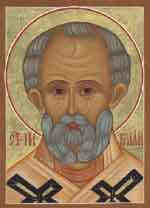Nicholas began life as a boy at the turn of the 4th century in Lycia's town of Patara back when there was only one flavor of Christianity under the Roman empire. The boy grew up to become bishop over Myra, currently located in Turkey--not the North Pole. The thing is, the man never forgot the boy. The man became the champion of children, especially impoverished orphan children. In devoting his life to this to giving (not getting), what Nicholas became was immortal.
 |
| 270-ish (278?) A.D - December 6, 343 A.D.--but his tomb is empty. |
Shame on all parents who tell their children that he doesn't exist. He did, and still does, in the form of all his Helpers who go by the same name of Santa (saint) Claus (short for Nicolas). They are all Santa Claus, every last one of them.
As old as I am, I still believe in Santa. I also know that there are people older than I am who still believe too. Why not? It's the truth--Santa is real.
I might as well point out that there was one famous jailbird that nobody in the Chautauqua circles ever mentioned, that knew what Santa's all about. That would be O. Henry. Make a point to read his "The Gift of the Magi" when you get a chance.
And speaking of other ancient history--Basques?
R.I.P. Nelson Mandela. Egypt and Libya could learn a lot from you.
"There is no passion to be found playing small - in settling for a life that is less than the one you are capable of living."Nelson Mandela (1918-2013)
Invictus
Out of the night that covers me,
Black as the Pit from pole to pole,
I thank whatever gods may be
For my unconquerable soul.
In the fell clutch of circumstance
I have not winced nor cried aloud.
Under the bludgeonings of chance
My head is bloody, but unbowed.
Beyond this place of wrath and tears
Looms but the Horror of the shade,
And yet the menace of the years
Finds, and shall find, me unafraid.
It matters not how strait the gate,
How charged with punishments the scroll.
I am the master of my fate:
I am the captain of my soul.
--William Ernest Henley
There are a few radio angles to the ending of South African apartheid, and they're both losses. One loss was the old voice of Radio RSA with its bokmakierie interval signal.
I was a big fan of the station and in particular, Leo Van der Walt. And there was the loss of the availability of South Africa's stellar shortwave radio receiver, the Barlow-Wadley XCR-30, during the divestiture actions of the U.S. I was able to get one but only by buying it used, and I was damn lucky that the owner actually wanted to part with it. That would be Dave Walcutt, who now works for Voice of America. Hi, Dave!
There are a few radio angles to the ending of South African apartheid, and they're both losses. One loss was the old voice of Radio RSA with its bokmakierie interval signal.
I was a big fan of the station and in particular, Leo Van der Walt. And there was the loss of the availability of South Africa's stellar shortwave radio receiver, the Barlow-Wadley XCR-30, during the divestiture actions of the U.S. I was able to get one but only by buying it used, and I was damn lucky that the owner actually wanted to part with it. That would be Dave Walcutt, who now works for Voice of America. Hi, Dave!
Regarding polyglots, the BBC posted about a student winning an award for being fluent in the most number of languages. When one goes down the list of the different languages he speaks (English, Greek, German, Spanish, Russian, Dutch, Afrikaans, French, Hebrew, Catalan and Italian), another polyglot can see the related languages, laugh, and accurately make the claim that he's actually speaking fewer languages than he claimed. Greek and Russian are related; French, Spanish, Catalan and Italian are related (what, he doesn't claim to be fluent in Portuguese? That's a gimme!). Dutch and Afrikaans are very closely related, and those are Germanic. Hebrew stands alone, but with that one he can claim fluency in a number of dialects of Arabic--another gimme. The German-related Yiddish would be another gimme. English, of course, is related to all of them, although German-based.








No comments:
Post a Comment